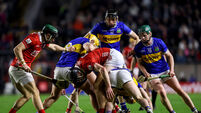Regulator refuses to quit despite criticism
During questioning at the Oireachtas Committee on Economic and Regulatory Affairs, Mr Neary admitted yesterday that the Irish financial system owes almost €69 billion to the European Central Bank (ECB) and could yet need to be partly nationalised to remain solvent.
He also insisted he only ever acted in the best interest of the public, after his position was called into question by the committee.













